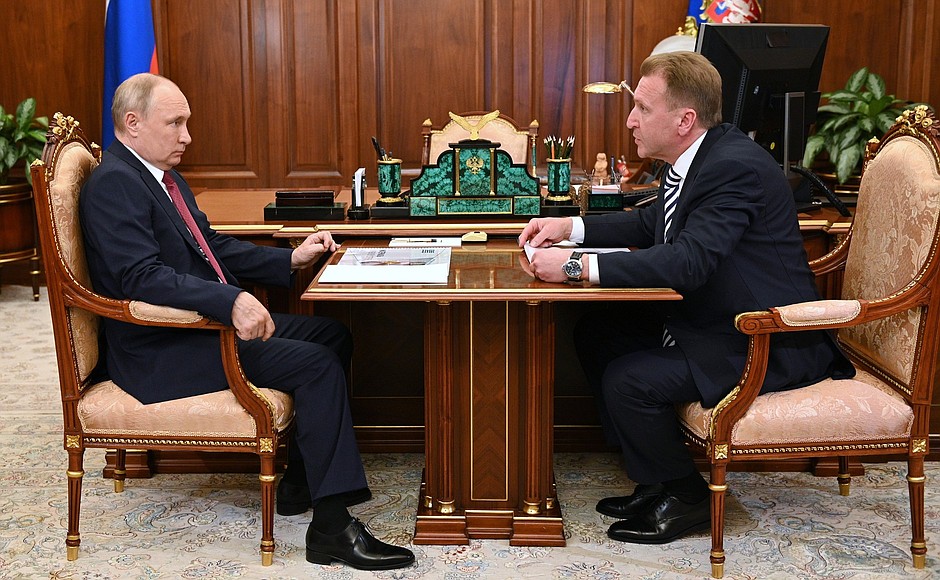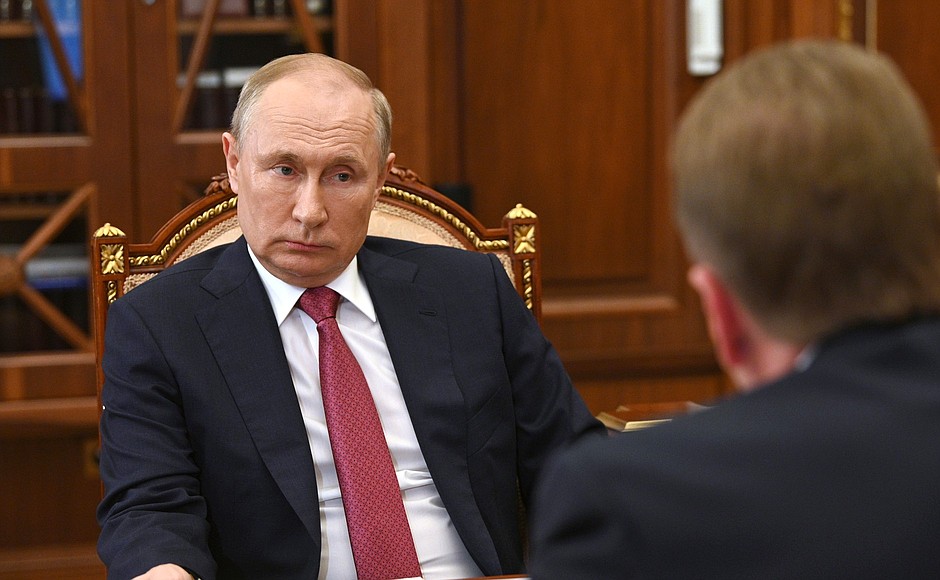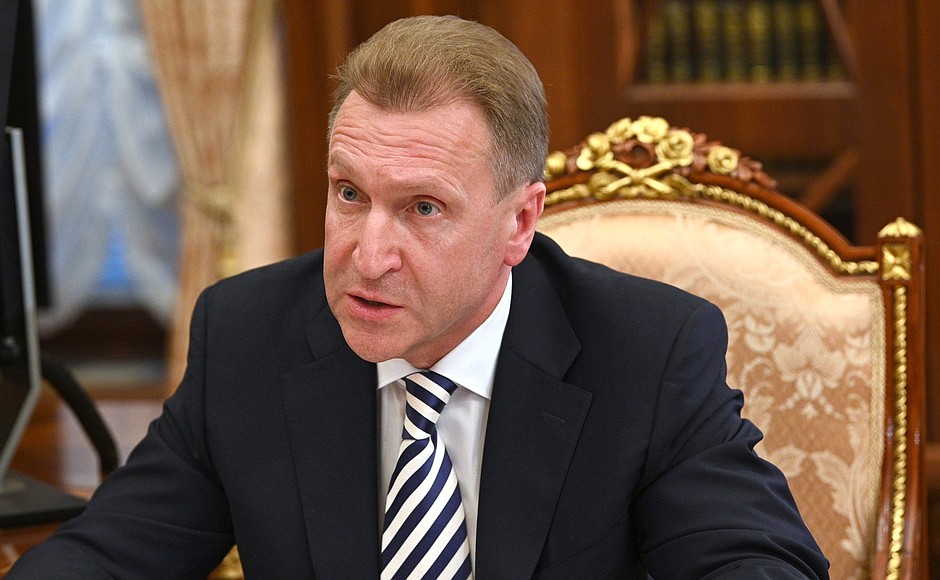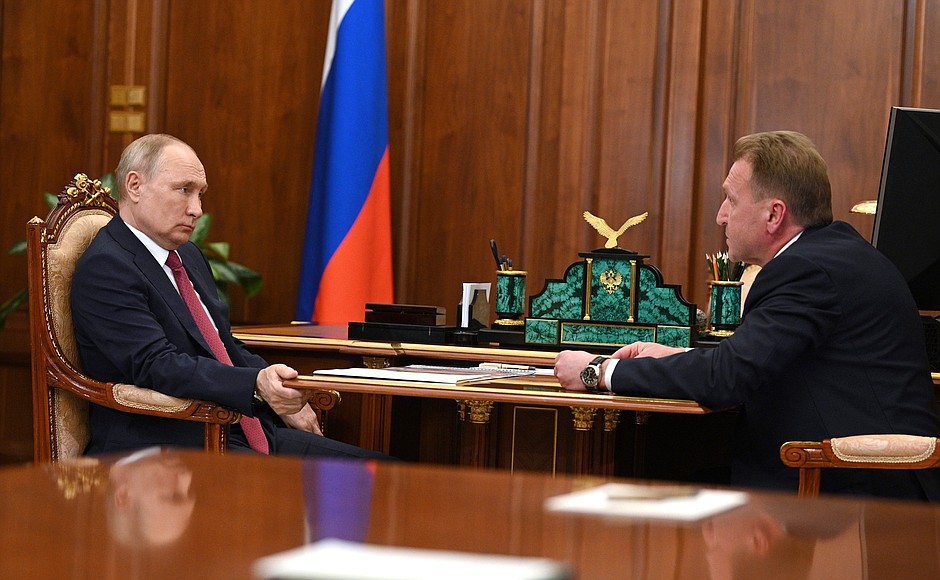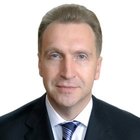President of Russia Vladimir Putin: Mr Shuvalov, as a development agency, VEB’s central purpose is to bring in investment in order to implement national development projects and, ultimately, improve people’s standard of living. However, VEB has a strategy for its own development. What I mean is that it was recently decided that VEB should develop not as a separate entity, but as a group of companies. A number of agencies of this kind were made part of the VEB system.
I would like to hear your vision of VEB's future as a development institution – this is my first point. Then, of course, we will discuss specific areas, because, as far as I can see from the documents, a fairly large volume of projects have gained support, amounting to almost 9.5 trillion rubles.
Please go ahead.
Chairman of the State Development Corporations VEB.RF Igor Shuvalov: Thank you, Mr President.
In 2018, you set the goal to revive VEB, and I am here to report to you that by now the revival of VEB, the rehabilitation of this lending institution in part related to VEB lending operations, has been completed.
VEB is in good shape with capital adequacy running high at about 17 percent. VEB has enough liquidity to carry out its business plan.
In 2018, a planned target was also adopted to support projects of up to 3 trillion rubles, but in conjunction with commercial banks. And then you set the goal for VEB not to compete with commercial banks, but rather to help these banks and private individuals start new projects, so the amount you mentioned is precisely the amount that has resulted from our teamwork with Sberbank, VTB and Gazprombank. Otkritie Bank has joined in fairly recently. We think that large regional banks will get involved in this work next year as well.
We have heavily invested in promoting urban development and the urban economy agenda. We started out by launching a pilot project on urban transport – buses – in Tver. We are now launching a pilot project for tram traffic in Taganrog. We are going to places where projects are not yet widespread, and where support provided by a development bank to commercial banks is vital in making such projects a reality. In Tver, after everyone realised that the project was paying back, we re-assigned our share to Sber. Next, we will begin to develop tram traffic in pilot cities; there are 7 to 10 of them. We followed closely what you had to say at the United Russia congress. This is one of the projects in which VEB, in conjunction with regional authorities, can help the Government.
Mr President, today we are at a point where the previous strategy, adopted in 2017, has been fully implemented, and the business plan, adopted in 2018, has been implemented as well.
In December 2020, the Government decided to consolidate development organisations under the VEB auspices. Then, we had our consultants and all these organisations, including SMEs and the REC, as well as the large innovation bloc that includes RUSNANO and other organisations, including Skolkovo – join us in working on a development strategy in a variety of areas. This work has now been completed. Corporate procedures are underway in all these organisations seeking to formalise a common strategy for VEB and all other organisations.
We have conducted an audit during these months, and we know in detail the situation at each of these organisations. A federal law has been adopted amending the Federal Law on VEB. Mr President, thank you for supporting that law, which has formalised our governing powers over these organisations, as well as – which is most important – the notion of our entrepreneurial activities. It said for the first time that these entrepreneurial activities must be socially oriented, that this must be a social enterprise, and that economic projects must have a serious social effect. In fact, this is the agenda which everyone is discussing now, with social and environmental impacts and influence on current governance methods, which is becoming the basis of our activities and our mandate.
I would like to say a few words about this new perimeter of our activities. We have an absolutely new, big block for VEB – innovation activity. Widely different organisations have been included in our perimeter, such as small funds that issue grants, and organisations that are to create a major infrastructure for innovation activity.
We take a broader view of our mission. Mr President, we believe that we should work together with Moscow State University and the Technological Valley to be established there, with Tomsk University, with Innopolis in Tatarstan, and with Russia’s other major universities. In other words, we must create a new, broad combination of various objectives, where we will coordinate our efforts and work together without bumping into each other in some projects, but instead helping each other to implement these projects.
You mentioned in your Address to the Federal Assembly that we should help draft projects, instead of evading them by saying that there is no necessary project documentation available. In this context, we must learn to support each other, so that we can also support projects in the innovation sphere, from tiny start-ups to large loans for industrial purposes based on the so-called seamless technology.
Next, I would like to say a few words about our current portfolio. It includes major projects, such as Ust-Luga, the Amur Gas Processing Plant and the Amur Gas Chemical Complex, which I have told you about, plus municipal transport and tram lines, as well as one of the projects you have supported – the construction of modern schools, where VEB has a special role to play. The funding for these schools will come from three sources: federal allocations, regional funds and commercial banks’ loans. VEB will be supporting commercial banks in this project.
A special purpose vehicle has been established. The Government has decided that it will be able to operate throughout the country. It is called ProSchool and is a subsidiary of Prosveshcheniye Education Holding, which, as you are aware, now has Sber, RDIF and VEB among its members. In other words, we have created a major partnership, which we will also use to promote the school construction project.
Vladimir Putin: To reiterate, as a reminder, the Ministry of Education is at the helm of the industry. As far as I remember, there was an idea to create a board of trustees. It does not matter what you call it, what is important is what mandate this agency, led by the Minister, will have.
Igor Shuvalov: Mr President, we are aware of your instruction. We are carrying it out and will see to it that it gets fulfilled. We are closely following the meetings, including your meeting with the Minister of Education, where you conveyed just this. We are aware of our responsibility. Business is a separate thing, and Prosveshcheniye has a great responsibility to shareholders – this is business, but regarding education, we will be doing all this under the leadership of the Ministry of Education and the Minister of Education.
A new large and more ambitious block to support exports has become part of our strategy. It includes our close neighbours, and exports support within the EAEU formats; it also includes the far abroad and breaking into new markets, as well as support for small and medium-sized businesses, and our major projects in places where we believe that we must support bank capital so that, during the first investment phase where there are high risks, we can share these risks with commercial banks.
Our support, via all development organisations, including VEB, for the economy and commercial banks and, most importantly, for the originators of these projects, will amount to about 17 trillion rubles which is 70 percent more than during the previous period. This is the total amount of funding. This is not our money. We will strive to launch projects with as little of our tools, money and guarantees as possible. But there will be a certain balance at all times so that the commercial banks feel comfortable joining these projects. We will stay with the project until a commercial bank can fully replace VEB's funds.
Vladimir Putin: Ok.
<…>
